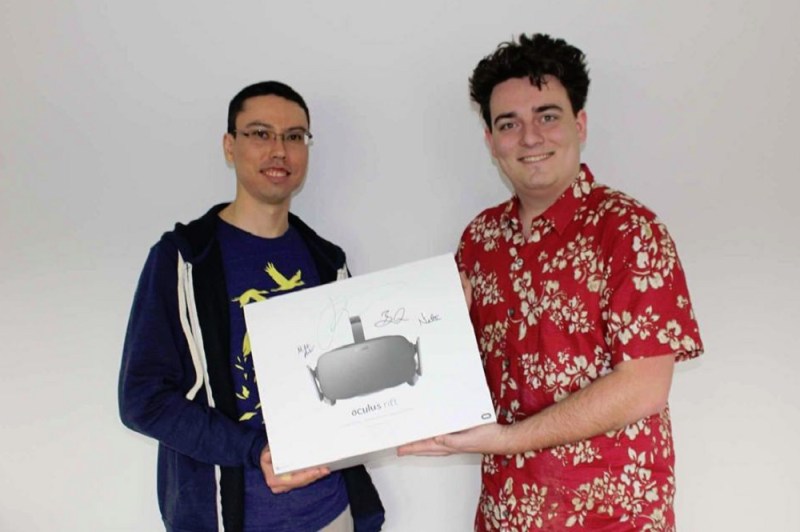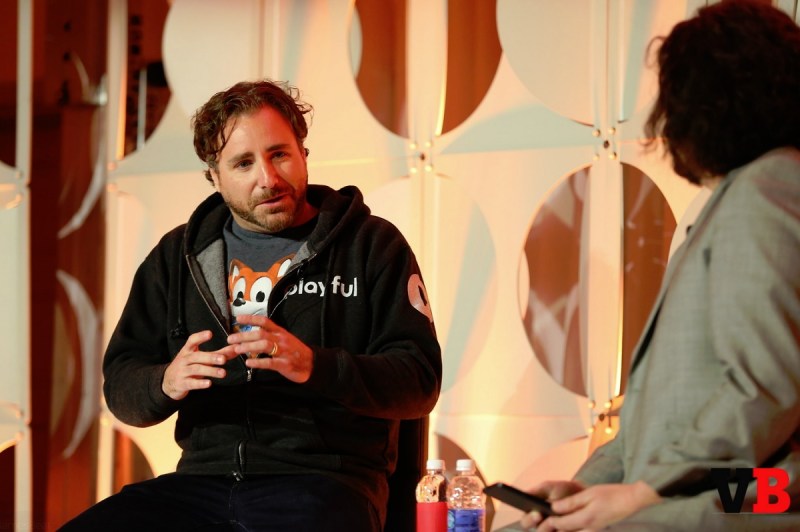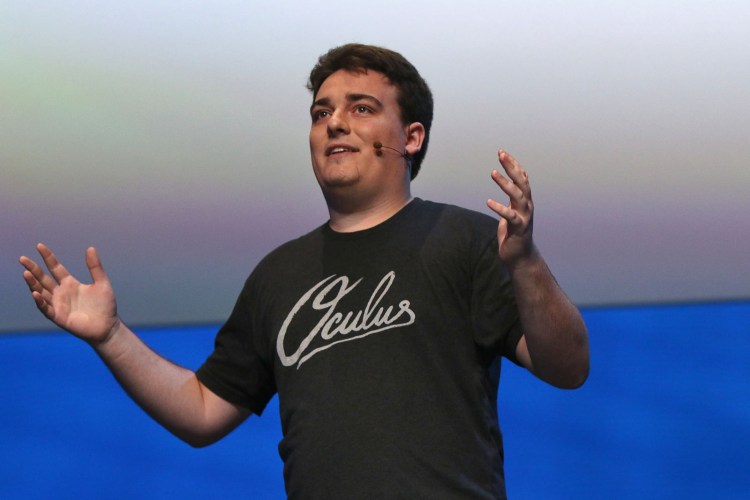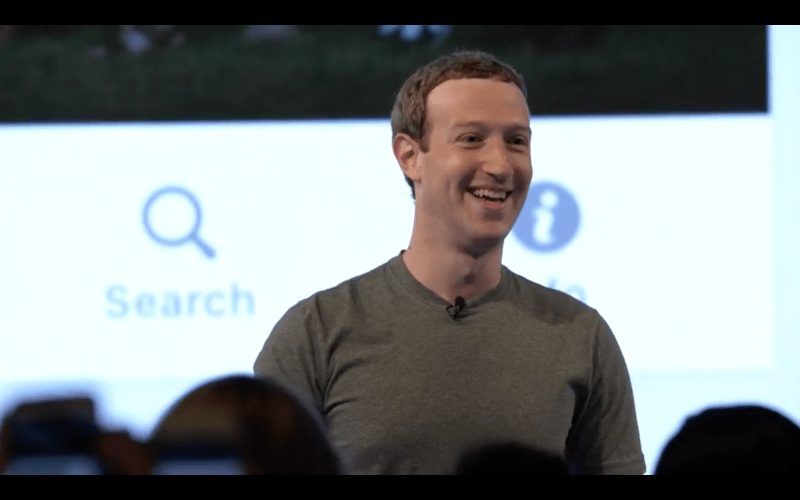That was the other thing. I have no bone to pick with Facebook. I think it’s a free service that does a lot of good things. There are some harmful effects, in my opinion, but you can use it or not use it. I know some people, some journalists out there, think it’s an evil company that needs to be destroyed or something like that. That’s not my opinion at all. I was just shocked by how all this played out with Palmer. His experience seemed like a pretty good proxy for a lot of things going on in the digital landscape, from online mobs to politics in the workplace. I think what happened to him was unfair. At any company I would feel that way. I believe that if he had different politics he would still be at the company.
But the fact that this was happening at Facebook, a company that is–explicitly and internally, so much of their ethos is based on openness and transparency. I think that for the most part, they’re pretty sincere about it. I don’t think those are just empty words. But it did feel to me that when push came to shove, they were empty words. In particular, for Mark Zuckerberg, who has spoken — not too recently, but in the past — at length about privacy and believing that our digital lives and our personal lives are the same thing — he doesn’t seem like a big fan of privacy. He preaches openness and transparency. Yet he was the least open and least transparent one in this whole situation, going so far as to direct what Palmer would post about supporting a different political candidate than the one Palmer actually planned to vote for.
That was how the relationship came to an end. I think it’s unfortunate. So much of the book is a really positive, inspiring story, with ups and downs. There are some cautionary elements or debatable elements, like whether it was a good idea for Oculus to wait on the hand controller, the Touch controllers, until nine months after launch. I have my opinion, but ultimately it’s debatable. Whether they waited too long for the launch–they’re all good conversation points.
For anyone who’s already read the book, you probably felt the same way I did writing it. The last 100 pages are a completely different book, almost. I don’t think it had to be that way. It’s interesting that what Palmer seemed to experience, being lied to by the company and being pushed aside, was how I felt writing it. But I’m glad that I was the one in the position, and I’m glad, like I said earlier, that my wife was able to support me while I chose to try to get answers to that stuff, so I could make sure it was included in the book.
At the end of the day, the goal of getting into VR and AR is to own a piece, or have some role, in the metaverse, as it were, and to have a leadership role in shaping our virtual reality. I think the things that the company does in actual reality are very relevant to how they would govern in a virtual reality, what sort of things we might expect from the company.

Above: Ross Martin and Palmer Luckey showing the first commercial Oculus Rift.
Question: Were you able to get Palmer to keep talking to you after this cutoff happened, or did you have to stop talking to him as well? Since it’s come out, have you gotten more reaction from Facebook?
Harris: Like I said, starting in February 2016, that was when my relationship and having access to people at Oculus began. This all took place between September 2016 and March 2017. During those six months, in which Palmer was forbidden to talk to his colleagues or to explain the situation, other than through the statement Mark had written and that he posted, I was talking to him. There were things he couldn’t say to me, but I do think that Facebook forgot I was–I mean, that I had a relationship with him.
He was careful about not talking about some of the stuff that happened that day. But when Gizmodo was doing Palmer Watch every day — where’s Palmer, we haven’t heard from him, he hasn’t been on social media — and people were wondering if he was being disappeared, I was talking to him every day. That was fascinating on a human level, to see someone who was no longer a daily part of something that they felt so connected to, and which they almost literally were the face of for an entire industry. Some of that is in the book. There’s a chapter about his exile.
After he exited the company–I assume one of the conditions was that he couldn’t tell me, that he had signed an NDA. But given our relationship it was pretty obvious. Unless he just suddenly became an asshole. [laughs] But no, he couldn’t talk to me about a lot of stuff. I still felt it was valuable to maintain the relationship, because like I said, I want to tell a character-driven story. Continuing to get to know him and how he thinks about certain things was helpful. The excuse to keep talking was to spend a lot of time talking about his new company, which is called Anduril. It’s a defense technology company.
In terms of the reaction from Facebook, I knew–I haven’t heard anything from people there in the past week or so, but I know that earlier in January, some employees were posting internally about the book, and they seemed to be excited. A manager calmed down their excitement, or curbed that enthusiasm, and said that–the response from management, in private conversations that I was told about, was that they didn’t know what was in the book, but they had heard that it was including manufactured drama, and was heavily focused on Palmer. Oh, and that they had worked with me early on, but then I broke trust with them.
I’m still not really sure what they mean by that, but they’ve said that a lot. There’s nothing in the book–the reason I knew they said this is because I got a lot of messages from people at the company who thanked me for keeping everything that was off the record off the record. I also just think it was significant in general that I knew what was being said. Maybe there was more I didn’t know about, but I think a lot of the people at the company, regardless of their political views, were not happy about how that whole situation played out, and felt a sense of distrust with the company. They were more willing to trust me, because I seemed to have more information.
They had the book for several weeks at that point. It’s not the worst kind of lie to say they hadn’t seen it yet, when they had. But just, wow, openness and transparency? And since the book came out, Facebook has done–it’s like a cut and paste operation for the past year. Every time there’s a negative story about them, they just say that not everything in the story is correct, without specifying what’s incorrect or providing any additional comment. It’s about what I expected. I guess we’ll see if there’s any more from there.
Question: The chapter “Nine Stories,” you could probably take that chapter and expand it into a book of its own, just based on the indie dev renaissance that sprang up as a result of Oculus. How did you distill all the stories from the indie scene down to those nine?
Harris: I don’t think I’m going to expand it out into a book, but if anyone were going to, I’d love to read that book. Or just write more about the indie dev experience. So much of what was wonderful about Oculus and the energy from the early days goes back to a decision that Brendan Uribe, the CEO and co-founder of the company, really helped to push, which was–Palmer’s initial vision for the Kickstarter, or for Oculus, was to get development kits out to other hardware enthusiasts and hackers like himself. By “kits” I mean actual put-it-together kits. Something I wouldn’t have known what to do with.
Brendan was really adamant that it needed to be a finished, complete kit. And then John Carmack was adamant even before that. I think Palmer was moving in that direction. But what was not initially the case was that–I make a comparison between Oculus and Ouya in the book, which was another potentially disruptive gaming system. They sold, for $99, a system that went to developers, but also consumers. That was their product. Early on Oculus made the decision that their customer was not going to be someone like me. It was going to be positioned exclusively for developers, with the goal of exactly what you’re describing, to have this sort of renaissance or this excitement and being a developer-focused company.

Above: Paul Bettner of Playful and Jeff Grubb of GamesBeat.
In that chapter I tried to pick people–it was hard. A had a list of about 20 people I could have picked. In most cases it was ones that either had a continued storyline throughout the book, or should have had, and will have in the paperback edition. I just never was able to include that. For example, one of them was Justin Moravetz, who did Proton Pulse. Part of it was because I loved his story of how, when he was in middle school, for a science project they had them build something of the future, and he built a homemade VR headset. I think that really helped capture the passion of a lot of these people. But at the same time he was working at Sony, and that was something I thought might be worth exploring.
Another thing I could mention, though at the end of the day I made the decision–I don’t mean this as an excuse. But the length of the book was always a big issue with my publisher. My first book was 550 pages, so of course I felt this one would be 550 pages too. They were thinking more like 300. I think it was a good victory to get to 500. Hopefully by the paperback it’ll get a bit larger still.
People have been sharing stories, either developers or other people on the periphery of the industry, since the book came out. I love all those stories. I almost was thinking I’d like to set up a webpage for people to put up their stories. Something where–I didn’t want it to come across like I’m trying to take possession of their stories. I just want there to be a place where you can read all these stories.
At the end of the day, as cool as the DK1 was, or the Rift, or whatever iteration, or even any other competitor product, it’s really hard to make money, because the ecosystem is just not big enough. Anyone working in this space is almost certainly doing so purely out of passion or experimentation. That’s the stuff I’d like to write about. I really felt like I could have written that about almost any developer who was taking that risk. I just wanted to try to pick ones that would line up with the bundled games in the Rift, or other things that I should have gotten to.
Question: Do you talk at all in the book about some of the competitors, like HTC and Valve or Magic Leap, what the whole ecosystem is doing?
Harris: Yeah, yeah. Console Wars is very much a corporate rivalry story. When I first started this, I think my actual pitch was, this is going to be a corporate rivalry story between Facebook and Microsoft with the HoloLens and Magic Leap and Valve and all these places. That was my perspective from the outside, having a console war mentality.
What I came to find when I got into the story, particularly the early years, was that it was such a collaborative process. As much as it can be between different companies who each, in the end, would like to beat each other. Valve, because of their role very early on with Oculus, and because a lot of the people there who were leading their small VR team, like Michael Abrash and Atman Binstock, ended up at Oculus, there’s a lot of focus on them in the earlier chapters. Not as rivals or competitors at that point, but just as a company with smart people who were curious about VR.
Later on in the book, there is not as much as one might expect there would be. For example, one of the chapters that was cut was just about Google’s VR project. I hope that will one day be returned to the book. But my thinking on a lot of this was, I wrote a book about stuff that happened 20 years ago. My first day of writing that, I knew what the beginning, middle, and end of the story were. It changed a lot from my outline, but I generally knew how it was headed. I knew what the pacing would be. This was a completely different beast, without even getting into Palmer Luckey.
Just as someone who constantly refreshed websites like UploadVR, who’s looking for every morsel of stuff that’s happening, there was a while where there were so many companies — the well-known ones like Magic Leap and Microsoft, and even the smaller ones doing games or middleware — because so much of it is passion-driven, it’s all appealing to me. For a while I had a Beautiful Mind sort of wall of all these companies and potential angles to go with. Maybe that would have worked as a book, but the more I thought about it, the more I factored in the unknown of it all. All too often these things are pitched as the big breakthrough, the next big thing, and I didn’t really feel like I could make reliable bets on whether that was accurate or not.


